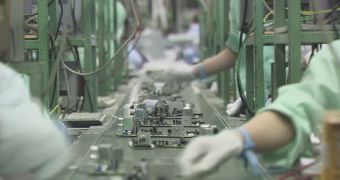Apple is working to be environmentally friendly, but they have a lot to do in their supply chain. According to a report by the Associated Press, Apple has banned two hazardous chemicals from their iPhone and iPad assembly lines.
This counts as the tech giant's latest commitment to protect factory workers hired by the two huge Chinese plants. The report mentions benzene and n-hexane as the two chemicals. The decision announced yesterday comes after five months of protests organized by activist groups China Labor Watch and Green America.
There's also a petition posted on change.org for Apple to stop using carcinogen Benzene in their products. The posters say that tech companies such as Apple allowed for the category 1 carcinogen Benzene to be used in their products. Benzene was already banned in western countries for industrial use. However, that was not the case for China. The country hosting the largest manufacturers of electronic devices does not have a regulation to outlaw the use of Benzene. Therefore, Apple was urged to ban it because it was hazardous for the workers. Apple was also requested to take responsibility for health-related issues with the workers.
A video posted on the change.org petition page follows the story of people that are working for suppliers of tech giants like Apple. There were numerous reports on people that were diagnosed with leukemia after they were poisoned with benzene.
Some of them had to prove that their condition was work related, but they were denied compensation. A few patients could not bear their condition and committed suicide.
The same video admits that benzene is used in a wide variety of industries, from manufacturing sporting goods, clothing, printing and electronic products. The workers making those products are exposed to this chemical, as well as the customers. The latter do not have the option of getting benzene-free electronics. The problem is that a benzene-free electronic device would only cost consumers less than $1 (€0.75). Studies have linked n-hexane to nerve damage.
The petition was already signed by over 1600 supporters and it needs a little bit over 800 to go through.
However, Apple made some progress in that field. According to Associated Press, the Cupertino tech giant has conducted a four-month investigation at 22 factories and found no evidence of benzene and n-hexane in the production of iPhones. Even so, Apple has decided to ban these chemicals completely from their suppliers' plants.

 14 DAY TRIAL //
14 DAY TRIAL // 